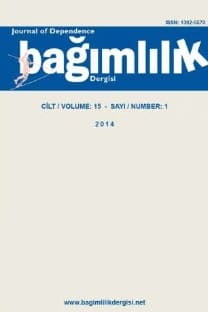Alkol bağımlısı hastalarda gözlem altında disulfiram tedavisi
Amaç: Alkol bağımlılığında disulfiram tedavisinin en önemli zorluğu hastaların kendi başlarına bırakıldıklarında ilacı almayı bir süre sonra terk etmeleridir. Bu çalışmada gözlem altında disulfiram verilen hastaların tedaviye uyumları ve içmeme sürelerinin gözlemlenmesi amaçlandı. Yöntem: Alkol bağımlısı 38 hastaya bir yakınının gözlemi altında 500 mg/gün disulfiram almaları önerildi. Tedaviye uyum ve içmeme süreleri izlendi. Bulgular: Çalışmaya alınan 27 hasta disulfiram kullanmayı kabul ettikten sonra tedaviye devam etmiştir. Bu hastaların, disulfiram başlandıktan sonra takibe devam ortalaması 109 gündü (mim 20 gün, max: 1 yıl). Onbir hasta disulfiram kullanırken alkol almayı denediğini bildirdi. Bir hastada di¬sulfiram alırken tekrarlayıcı bir şekilde alkol aldığı için disulfiram kesildi. Beş hastada gelişen organik beyin sendromu ve 2 hastada gelişen kas güçsüzlüğü disulfirama bağlanarak tedavi sonlandırıldı. Yan etki nedeniyle disulfiram tedavisi sonlandırılan hastaların üçünde tablo düzeldikten sonra disulfiram, daha düşük dozda (250 mg/gün) yeniden başlandı. Dokuz hasta disulfiramı önerildiği şekilde ve düzenli olarak kullandı. Bu hastalarda ortalama 6 ay içmeme sağlandı (min: 2 ay, max: 12 ay). Sonuç: Bu bulgular süpervizyon altında disulfiram kullanımının uygun alkol bağımlısı hastaları için tedavi seçenekleri arasında yer alması gerektiğini düşündürmektedir.
Supervised disulfram treatment in patients with alcohol dependence
Objective: Main difficulty during disulfiram therapy in alcohol dependence is that the patients quit taking their me-dication after a while if they are taking it on their own. This study aims to observe the treatment compliance and length of abstinence in patients taking disulfiram under supervisi-on. Method: This study presents the treatment follow-up of 38 alcohol dependent patients who were recommended to take disulfiram 500 mg/day under the supervision of a significant other. Their compliance and abstinence durations were observed. Results: 27 patients continued the treatment after they accepted supervised disulfiram therapy. The mean duration of follow up of these patients was 109 days (min: 20 days, max: 1 year). 11 patients reported that they tried taking alco¬hol while they were on disulfiram. Disulfiram was disconti-nued in one patient because of repeated alcohol use while taking this medication. Medication was discontinued becau¬se of organic brain syndrome in 5 patients and because of muscle weakness in 2 patients. İn 3 of the patients who stop-ped taking disulfiram due to adverse effects, this medication was restarted at a lower dose (250 mg/day) after the adverse symptoms subsided. 9 patients took disulfiram regularly as recommended. A mean of 6 months (min: 2 months, max: 1 year) of abstinence was provided in these patients. Conclusion: These findings suggest that supervised disulfiram therapy should be in the treatment menu in the treatment of alcohol dependence for suitable patients.
___
- 1- Fuller RK, Branchey L, Brightwell DR, et al. Disulfiram treatment of alcoholism. A Veterans Administration cooperative study. JAMA 1986; 256:1449-1455.
- 2- Azrin NH, Sisson RW, Meyers R, et al. Alcoholism treatment by disulfiram and community reinforcement therapy. J Behav Ther Exp Psychiatry 1982; 13:105-112.
- 3- Sereny G, Sharma V, Holt J, et al. Mandatory supervised antabuse therapy in an outpatient alcoholism program: a pilot study. Alcohol Clin Exp Res 1986; 10:290-292.
- 4- Hughes JC, Cook CC. The efficacy of disulfiram: a review of outcome studies. Addiction 1997; 92:381-395.
- 5- Chick J, Gough K, Falkowski W, et al. Disulfiram treatment of alcoholism. Br J Psychiatry 1992; 161:84-89.
- 6- Azrin NH. Improvements in the community-reinforcement approach to alcoholism. Behav Res Ther 1976; 14: 339-348.
- 7- Gerrein JR, Rosenberg CM, Manohar V. Disulfiram maintenance in outpatient treatment of alcoholism. Arch Gen Psych 1973; 28: 798- 802.
- 8- O’Farrell TJ, Bayog RD. Antabuse contracts for married alcoholics and their spouses: a method to maintain antabuse ingestion and decrease conflict about drinking. J Subst Abuse Treat 1986; 3: 1-8.
- 9- Brewer C. Controlled trials of Antabuse in alcoholism: the importance of supervision and adequate dosage. Acta Psychiatr Scand Suppl 1992; 369: 51-58.
- 10- Brewer C, Smith J. Probation linked supervised disulfiram in the treatment of habitual drunken offenders: results of a pilot study. BMJ 1983; 287: 1282-1283.
- 11- Banys P. The clinical use of disulfiram (Antabuse): a review. J Psychoactive Drugs 1988; 20: 243-261.
- 12- Lundwall L, Baekeland F. Disulfiram treatment of alcoholism: a review. J Nerv Ment Dis 1971; 153: 381-394.
- 13- Brewer C. Patterns of compliance and evasion in treatment programmes which include supervised disulfiram. Alcohol Alcohol 1986; 21: 385-388.
- ISSN: 1302-5570
- Yayın Aralığı: Yılda 4 Sayı
- Başlangıç: 2000
- Yayıncı: Galenos Yayınevi
Sayıdaki Diğer Makaleler
Sevil KURAL, Cüneyt EVREN, Duran ÇAKMAK
Alkol bağımlısı hastalarda gözlem altında disulfiram tedavisi
L. İlhan YARGIÇ, Habib SOLEİMANVANDİ
Obezite tedavisi için başvuran hastalarda madde kullanım yaygınlığı ve ilişkili faktörler
